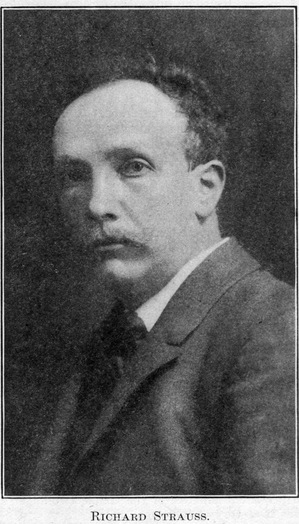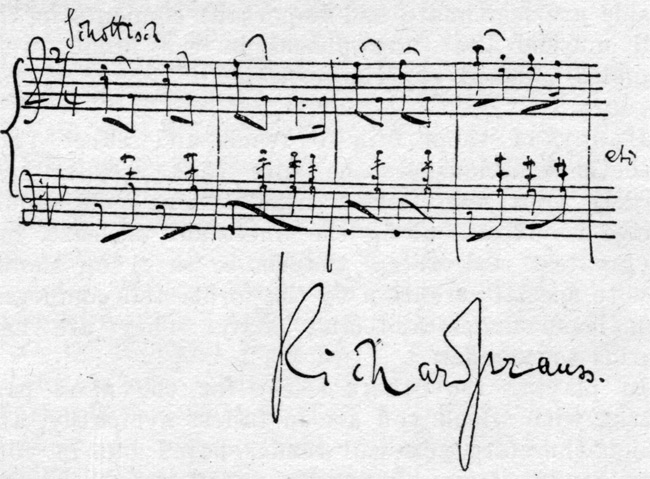So much interest is manifested in Richard Strauss, the composer, at present in the United States, that we reprint the following selections from an article by Gustav Kobbé: —
To begin with, he is no connection of the “waltz” family. His father, to whom was vouchsafed the joy of living long enough to witness the honors showered upon his son, was a horn player, and one of the best in Europe, in the Royal Orchestra, Munich. He composed, but exclusively for his own instrument.
 Richard was born in Munich on June 11, 1864, so that he has become internationally famous before reaching forty. He received his first piano lessons from his mother when he was four years old. At the age of six he gave a remarkable example of precocious aptitude for music. Hearing some children singing around a Christmas tree, he said, “I can compose something like that,” and forthwith composed a three-part song. His mother was obliged to write in the words, because his pothooks were too large. Thus he was able to write music before he could write in letters.
Richard was born in Munich on June 11, 1864, so that he has become internationally famous before reaching forty. He received his first piano lessons from his mother when he was four years old. At the age of six he gave a remarkable example of precocious aptitude for music. Hearing some children singing around a Christmas tree, he said, “I can compose something like that,” and forthwith composed a three-part song. His mother was obliged to write in the words, because his pothooks were too large. Thus he was able to write music before he could write in letters.As there always was a lot of loose music paper lying about the house, his mother used it to cover his school books with. The temptation to jot down his musical ideas on these covers proved irresistible to the lad, and whenever he had the chance he was working on the outside of the books instead of studying what was on the inside. Among other things he sketched out in this manner the scherzo of his string quartette, which has been published as Op. 2.
He composed a whole symphony while he still was at school. Levi, the conductor of the Royal Orchestra and one of the best musicians in Germany (he led the orchestra at the “Parsifal” production at Bayreuth, in 1882), saw the manuscript, and was so struck with its genuine musical interest that he produced it at a concert.
During the previous year (1880) three of his songs had been heard in public. Moreover, shortly before his symphony was produced the string quartette already referred to was performed. During all his school years he continued his piano lessons, and also studied violin. He furthermore took a thorough course in composition from F. W. Meyer, court conductor at Munich. In 1882, while he was at the University of Munich, he composed a serenade for wind instruments. This attracted von Bülow’s attention, and earned for Strauss an invitation to become von Bülow’s assistant as conductor of the orchestra at Meiningen, a position which gave him great experience, especially, when soon afterward von Bülow resigned and the young musician became conductor.
He remained at Meiningen until the spring of 1886,
when he became assistant conductor at the Munich Opera. There he remained until 1889, when he entered upon the conductorship of the Weimar orchestra.
After an almost fatal attack of pneumonia in 1892, he made a long tour of recuperation through Greece, Egypt, and Sicily. But his genious was too active to rest, and it was on this tour that he composed his opera of “Guntram.” This was produced at Weimar in May, 1894.
A pretty romance is connected with the work. After the first performance, the engagement of the composer to the heroine, Freihild, was announced. She was Pauline de Ahna, the daughter of a Bavarian general. He left Weimar for Munich, where he remained until called to the Royal Opera, Berlin, in 1899.
Strauss is fond of outdoor exercise and devotes much time to it when he is at his pretty mountain cottage at Markwartstein in the Bavarian Alps. Almost his only other recreation is the game of skat. He tries to steal some time every day to devote to it. When in Berlin, he can be seen daily at the Cafe of the Kaiserhof indulging with a few friends in a social encounter at his favorite game.
He is a great worker. Recently he conducted fourteen concerts in as many days, with a rehearsal of three to five hours for each concert.
At one of these rehearsals, after conducting “Heldenleben” (“A Hero’s Life”), he told a friend that he had spent a year and a half on its composition, and that the violin solo in it was intended for a musical portrait of his wife.
Strauss’ originality has made him a new force in music. He is a close student of Wagner, but not an imitator. Moreover, as Liszt invented the symphonic poem, so Strauss has invented the “tone poem.” This may be described as the freest development of the symphony yet devised by a composer, and an indication of the individuality that has been so startling to the musical world.
As a matter of interest to our young readers we add an account of Strauss’ story concerning the writing of his Op. 1.
I must recognize not less than three different works under the distinction of Op. 1, a published composition, a written one, and one neither printed nor written down by me. The published work which appears as Op. 1, a “Festival March” for full orchestra, was brought out about 1880 by Breitkoph & Härtel. When I was seven or eight years old I had written a “Christmas Song,” which I proudly marked as Op. 1. But my very first piece of musical invention was still earlier. It was a little schottische which I had played on the piano and called “Schneider Polka.” As I could not write with pen and ink my father wrote down the little piece, orchestrated it, and in this form it was played in the Gärtnerplatz Theater, in Munich as an entr’acte. It began:—




